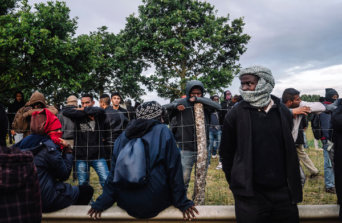- About
- Topics
- Picks
- Audio
- Story
- In-Depth
- Opinion
- News
- Donate
- Signup for our newsletterOur Editors' Best Picks.Send
Read, Debate: Engage.
On the other side of a freight tunnel is a better life. Not benefits, not welfare, but a better life; safer job prospects, a familiar language, a strong currency. From a camp called the Jungle, they walk a few miles, leap over fences, outrun police, all for the chance to get to this tunnel.
It might sound like the plot of a Hunger-Games style movie, but that’s what many migrants are doing in Calais every evening – leaving the makeshift refugee camp they call the Jungle, to make a break for the freight tunnel – if they can make the safe passage through the tunnel, in the back of a truck, or clinging to its underside, they’ll have the chance of a better life.
The Jungle, the camp that houses the migrants is horribly under-resourced, with only 30 toilets for the 3,000 people living there. To get to the UK, the migrants have to face obstacles which threaten their personal safety and wellbeing – they are not oblivious to the dangers.
The New York Times interviewed Mima, a 26-year-old migrant from Ethiopia, who said:
“The U.K. is not paradise, it’s not heaven, I know that,” he said. “I know it’s not safe to jump on a moving train. But we have no choice. If you had a choice, why would you do this?”
That’s the sentiment of many in the camp, which is mainly made up of refugees from North East Africa and the Middle East; it’s not clear whether the term “migrant” sufficiently captures the nature of their situation; they’re fleeing war, political persecution and in some cases, devastation of their countries.
But it’s more neutral than “illegal immigrant” or “alien”. The urge to politicise these people has been overwhelming from certain actors. The UK’s response?
That means not providing adequate help and assistance so lives are not put in danger, and it also means not providing help and aid to the countries of migration. It means fences, it means dogs, which in this author’s opinion is a ridiculously antiquated and inadequate solution to the problem and clearly geared to satisfy right-wing elements in the UK who fear their own perceptions of being “swamped”.
But as one police officer in Calais reflected: “it makes you think, this job. How can you judge a guy who has nothing, who is fleeing war and just wants a life for his family?”
